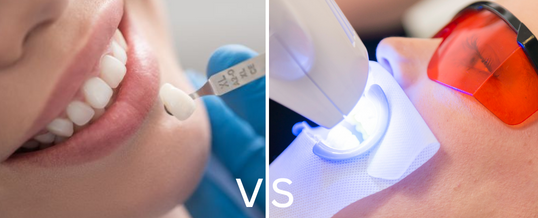
If you’ve been searching for ways to improve your smile, you might find the options out there a little overwhelming. Transforming your smile can be as easy as a slight cosmetic tweak, or as involved as full reconstruction of your teeth. Some of the more popular treatments involved in a smile makeover are in-clinic teeth whitening and Veneers. In this article, we will explore the key differences between the key differences ‘Teeth Whitening vs Dental Veneers’. Both treatments have their advantages and disadvantages, but which is right for you?
What are Dental Veneers?
Dental Veneers are permanent and used to correct tooth imperfections. Veneers can fix chips, cracks, gaps between teeth, minor misalignment and/or discolouration — they help correct many cosmetic dental issues. Veneers are thin porcelain or composite resin coverings that are bonded to the front surface of a tooth using dental cement. Veneer placement requires the permanent alteration — or “shaping” — of the patients tooth/teeth and because they are permanent, it’s essential to get all the information and weigh up the pros and cons before deciding to get them.
The initial dental visit for Veneers
The veneer procedure varies from patient to patient, but is typically completed over a six to eight-week period and requires two dental visits. The initial visit involves an assessment to ensure that there are no oral health concerns that may affect the treatment. A good cosmetic dentist will recommend teeth whitening first before matching the colour of your porcelain Veneers to your regular teeth, so they look healthier and whiter.
Teeth Whitening before Veneers
If you are unhappy with the colour of your natural teeth before your procedure starts, teeth whitening is an important step that needs to happen before you start the Veneers. It’s important to note that the Veneers themselves do not whiten, they typically stay the same colour from the time of installation. Some dentists use outside labs for veneer fabrication, while others use in-office CAD/CAM technology to fabricate onsite in a single visit. Depending on your dentist, temporary Veneers may be used between visits.
Dental Veneer procedure
During the actual procedure, the dentist will inject a local anesthetic to minimize discomfort. A fter the procedure, your dentist will explain to you the best practices to increase the longevity of your Veneers. This includes avoiding overly abrasive toothpaste and strong bristle toothbrushes and to avoid biting down on hard objects. If cared for properly, Veneers can last 15 years or longer before needing to be replaced.
What is Cosmetic Teeth Whitening?
Cosmetic Teeth Whitening is generally performed at a professional teeth whitening clinic and involves the application of a specialised gel (hydrogen peroxide or carbamide peroxide) to whiten the teeth. This treatment specifically targets tooth discolouration by removing staining embedded in the pores of the tooth enamel.
At-Home vs Professional Teeth Whitening
Although the best whitening results are most often achieved when performed by a dedicated teeth whitening specialist, there is a wide range of DIY teeth whitening options available online or over the counter. These Take-home whitening options have the lowest concentration of peroxide for the safety of the untrained home consumer, therefore limiting their whitening strength and effectiveness. See the full article At-Home vs Professional Teeth Whitening
How long does professional teeth whitening take?
Professional In-clinic Teeth Whitening generally takes one to two hours, during which a special oxygen-action whitening gel is applied to the front of the teeth; combined with the aid of a high-intensity light machine to help activate the gel and speed up the process. The gel migrates throughout the minuscule pores of the enamel, oxidising stains and leaving behind only the natural colour of the white dentin. Patients will see whitened results immediately after treatment. For a better understanding of this process, click on the following link https://www.ismile.co.nz/faqs
Candiancy for Teeth Whitening and Dental Veneers
Are you a Candidate for Veneers?
Dental veneer candidacy relies heavily on the health of the teeth. If you have no underlying issues such as tooth decay or gum disease, you may stand a better chance of being suitable for veneer treatment. However, if you do have problems your dentist may advise you against veneers; or at the very least suggest alternative treatments. Your dentist will always suggest the most conservative and least invasive option as a primary consideration. Dentists sometimes find people request veneers, even though they have an esthetically functional and attractive smile. If your issue is simply tooth discoloration, a dental veneer option may not be the best treatment for you. It requires the permanent alteration of your natural teeth, and can be considerably more expensive than whitening options that may well suffice.
Are you a Candidate for Teeth Whitening?
Teeth Whitening is a minimally invasive procedure that does not have stringent candidacy requirements, most people undergo treatment with great results. That said teeth whitening isn’t right for everyone. Poor dental hygiene can inhibit or prevent the whitening treatment being carried out. If you suffer from severe gum disease, tooth decay or have cracked teeth you will first need to undergo restorative treatment with your dentist before teeth whitening can be considered. If you have (intrinsic staining) staining to the interior of the tooth affecting the underlying dentin layers you will require a specialised whitening treatment.
Intrinsic Staining is most commonly caused by medication, genetics, age, root canal infections, tooth decay and injury. Teeth Whitening does have limitations and cannot correct all discolouration issues (such as those associated with severe damage to the dentin layer). In such cases, additional smile makeover treatments such as Veneers will likely be needed.
The cost of Teeth Whitening vs Dental Veneers?
Comparing the cost of whitening with the cost of Veneers is difficult as they’re both very different treatments and not all teeth require Veneers. There is some esthetic overlap between the two as they both deal with tooth discolouration. As discussed earlier whitening of the natural teeth may be recommended before the veneer procedure to get a healthy overall whiter smile. Veneers offer the additional benefit of esthetic and restorative work that teeth whitening simply cannot. Veneers can last 15 years or longer with proper care, teeth whitening maintenance may be required if the natural teeth discolour over time and no longer match the now whiter veneer.
The average cost of Teeth Whitening in New Zealand
The average cost of professional teeth whitening is $650 NZD. Cheap over-the-counter options can cost less than $50, but results tend to be disappointing.
The average cost of Veneers in NZD
Composite Veneers cost between $450 to $1200 NZD per/tooth and Porcelain Veneers cost between $1400 to $1900 per/tooth.
Prices above are conducted from a survery in 2022
Teeth Whitening vs Dental Veneers: Summary
Although teeth whitening results may last up to 12 months, discolouration does return overtime, it nonetheless provides an immediate whiter results. For this reason, it is very popular for people looking for an affordable smile makeover solution. Dental Veneers are more expensive initially, but offer additional benefits such as correcting more severe smile concerns such as uneven teeth, crowding, gaps, chips, cracks, etc. The associated whitened smile is simply a bonus.
iSmile Professional In-Clinic Teeth Whitening Auckland
iSmile offers the most developed, safe and gentle teeth whitening system available on the market today! iSmile Teeth Whitening Practitioners are fully qualified and registered members of the New Zealand Cosmetic Teeth Whitening Association (NZCTWA). Check out iSmile Teeth whitening treatment options.
Contact us today to schedule an appointment!
Learn more about Professional In Clinic Teeth Whitening Auckland
Follow iSmile on Instagram and Facebook
Go straight to iSmile Online Bookings
We hope you enjoyed this article: Teeth Whitening vs Dental Veneers
ShareOCT
2022

About the Author: